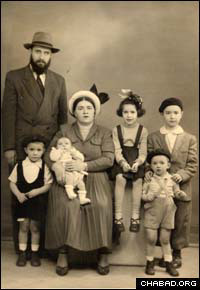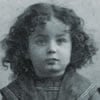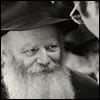Chana Schapiro, a lifelong Chabad-Lubavitch Chasid known for her devotion to her children's education, passed away yesterday in Brooklyn, N.Y. She was 94.
Schapiro, born in Yekaterinoslav, Ukraine, to Rabbi Schneur Zalman and Rivkah Vilenkin, remembered her childhood as a life fully enmeshed in Jewish life. The city, today known as Dnepropetrovsk, boasted tens of synagogues and thirty ritual slaughterers.
Rabbi Levi Yitzchak Schneerson, of righteous memory, father of the Rebbe, Rabbi Menachem Mendel Schneerson, of righteous memory, was the city's chief rabbi and a friend of Schneur Zalman Vilenkin.
The friendship between the two went back to their youth in the town of Podovranka. They studied together in the Chabad-Lubavitch synagogue and quickly developed a shared reputation for diligence in their lessons.
Three decades later, when Rabbi Levi Yitzchak moved with his family to Yekaterinoslav from Nikolayev, he asked his old friend to come to the city and teach his three sons. The learning sessions, which were joined by a few other students as well, took place in the small Vilenken home and concentrated on the Torah, Talmud and Jewish law.
The studies happened in secrecy to avoid the watchful eyes of the authorities. Schapiro's education was also fraught with danger. She and her siblings did not attend the public school, which would have required their attendance on Shabbat. Had they gone and refused to write on the holy day, they would have been suspected of being religious, which the Communist government did everything in its power to prevent. The girls, therefore, had a private teacher.
Schapiro frequently described her childhood home as pervaded by an atmosphere of Torah learning. As a wife and mother, she infused the same spirit in her own household despite several moves from city to city culminating in New York City. Back in Yekaterinoslav, the Vilenkin home hosted a regular study session in Chabad philosophy and was the location of many of the city's large Chasidic gatherings known as farbrengens.
Schapiro fondly remembered preparing for those gatherings with her parents and siblings. At the gatherings, her father shared words of Torah "in a way that everyone understood, even the children," said Schapiro.
Her father was also a ritual slaughterer. Schapiro remembered once taking a chicken to the chief rabbi to see if it was kosher.
Remembering the Chief Rabbi's Family

She related that her father would first learn with the future Rebbe and then, while Vilenkin taught the other boys, the Rebbe would move to a corner and learn on his own. Vilenken taught the Rebbe for four and a half years. "Later on, [the Rebbe] learned at his own home," said Schapiro.
Schapiro also relayed an anecdote from years later when the Rebbe was a teenager and she was a little girl. "The Rebbe had a (Torah book) belonging to my father. So he came to return it, I opened the door, [and] he stood there with a smile. He gave me the book [and] asked me to give it to my father."
Schapiro said that the Rebbe as always very courteous: "He thanked me and went on his way."
On one occasion some years later, Schapiro said, her mother returned from a bar mitzvah and relayed that the Rebbe, by then held in awe by the local populace, approached her, said hello and inquired after her family. It was a much appreciated gesture from one of the boys she had watched years earlier.
When her elderly father moved to New York, he attended the Rebbe's public gatherings, but often came late due to his poor health. When he entered, the Rebbe stopped and respectfully rose from his chair and remained standing until his teacher was seated. The same thing happened when Vilenken got up to leave. The Rebbe stood up until his teacher was out of sight.
Rabbi Levi Yitzchak and Rebbetzin Chana, the Rebbe's mother, could not make it to the Rebbe's wedding. The wedding with Chaya Mushka Schneerson, of righteous memory, daughter of the sixth Lubavitcher Rebbe, Rabbi Yosef Yitzchak, of righteous memory, took place in Warsaw, Poland. The groom's parents could not arrange permission to leave the Iron Curtain.
On the wedding day, Rabbi Levi Yitzchak and Rebbetzin Chana made a feast in their home. It was a very joyous occasion with much singing and dancing. Vilenkin jumped on to the table and began dancing. "I had the privilege," he called out, "the great privilege that my student has become the son-in-law to the Rebbe!"
Schapiro cherished her childhood memories and would relay them to her family on many occasions, urging them to use the anecdotes as lessons in their personal lives.
The Joint's "Best" Choice for the Chassidic Couple

Following WWII they escaped to Poland. From there they went to a refugee camp in Pocking, Germany, and then to Paris, France, where they lived for six years.
In 1953 they received a visa to the United States, and The American Jewish Joint Distribution Committee arranged for them to live in Cleveland, Ohio. En route they stopped in New York to visit the Rebbe. They mentioned how distraught they were to live in Cleveland. They wanted to live near the Rebbe, not in a city where they had no friends or relatives. The Rebbe instructed them to go to Cleveland and that, "wherever you go, everyone should recognize that you are a Chassidic Jew."
They lived there for the next two decades. During this period, hundreds of Yeshivah students from the city's Lithuanian-style Telshe Yeshiva visited their home to learn Chabad philosophy. "It was an open home, everyone was always welcome," says Schapiro's daughter Raizel Goldberg.
In 1973 they moved to the Crown Heights section of Brooklyn, where Rabbi Schapiro accepted a rabbinical position in a local synagogue. To this day he is an active member of the Central Committee of Chabad-Lubavitch Rabbis in the United States and Canada.
Schapiro raised her children with Chassidic warmth, educating them to be upright citizens and to appreciate Torah learning — an appreciation she learned in her parents' home. "She was devoted entirely to her children's education," says her youngest son, Rabbi Nochum Schapiro.
Schapiro looked at everything and everyone with a good eye and always found something nice to say about every person. Friends and family describe her as "very unassuming" and refined in the way she went about her daily routine. She never made a big deal of herself and she did not expect others to do so either.
"She never needed anything," said Rabbi Yehuda Leib Schapiro, Rosh Yeshivah of the Rabbinical College of Florida in Miami Beach, "There was no such a thing as 'I need this, I need that.'"
Before her son Nochum went as a student emissary to the Lubavitch Yeshivah in Melbourne, Australia, the family went for an audience with the Rebbe. The Rebbe told Schapiro, "Thank you for raising such children."
On the very day she passed away, a great-grandson of hers was circumcised and one of her granddaughters got married.
Schapiro is survived by her husband, Rabbi Lipe Schapiro; her children: Rabbi Sholom Ber Schapiro, Raizel Goldberg, Rabbi Yehuda Leib Schapiro, Rabbi Gavriel Schapiro and Rabbi Nochum Schapiro; and many grandchildren and great-grandchildren. Her son Levi Yitzchak passed away in 1990.







Start a Discussion